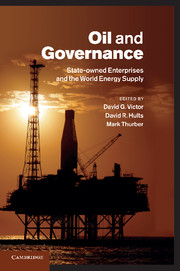Book contents
- Frontmatter
- Contents
- Figures
- Tables
- Boxes
- Contributors
- Acknowledgements
- Part I Introduction
- Part II Thematic studies of national oil companies
- Part III National oil company case studies
- 5 Saudi Aramco: the jewel in the crown
- 6 Oil, monarchy, revolution, and theocracy: a study on the National Iranian Oil Company (NIOC)
- 7 Handcuffed: an assessment of Pemex’s performance and strategy
- 8 Kuwait Petroleum Corporation (KPC): an enterprise in gridlock
- 9 China National Petroleum Corporation (CNPC): a balancing act between enterprise and government
- 10 Petróleos de Venezuela, S.A. (PDVSA): from independence to subservience
- 11 Awakening giant: strategy and performance of the Abu Dhabi National Oil Company (ADNOC)
- 12 Brazil’s Petrobras: strategy and performance
- 13 Sonatrach: the political economy of an Algerian state institution
- 14 Norway’s evolving champion: Statoil and the politics of state enterprise
- 15 Gazprom: the struggle for power
- 16 NNPC and Nigeria’s oil patronage ecosystem
- 17 Fading star: explaining the evolution of India’s ONGC
- 18 Petronas: reconciling tensions between company and state
- 19 Angola’s Sonangol: dexterous right hand of the state
- Part IV Conclusions and implications
- Part V Appendices
- References
- Index
16 - NNPC and Nigeria’s oil patronage ecosystem
Published online by Cambridge University Press: 05 January 2012
- Frontmatter
- Contents
- Figures
- Tables
- Boxes
- Contributors
- Acknowledgements
- Part I Introduction
- Part II Thematic studies of national oil companies
- Part III National oil company case studies
- 5 Saudi Aramco: the jewel in the crown
- 6 Oil, monarchy, revolution, and theocracy: a study on the National Iranian Oil Company (NIOC)
- 7 Handcuffed: an assessment of Pemex’s performance and strategy
- 8 Kuwait Petroleum Corporation (KPC): an enterprise in gridlock
- 9 China National Petroleum Corporation (CNPC): a balancing act between enterprise and government
- 10 Petróleos de Venezuela, S.A. (PDVSA): from independence to subservience
- 11 Awakening giant: strategy and performance of the Abu Dhabi National Oil Company (ADNOC)
- 12 Brazil’s Petrobras: strategy and performance
- 13 Sonatrach: the political economy of an Algerian state institution
- 14 Norway’s evolving champion: Statoil and the politics of state enterprise
- 15 Gazprom: the struggle for power
- 16 NNPC and Nigeria’s oil patronage ecosystem
- 17 Fading star: explaining the evolution of India’s ONGC
- 18 Petronas: reconciling tensions between company and state
- 19 Angola’s Sonangol: dexterous right hand of the state
- Part IV Conclusions and implications
- Part V Appendices
- References
- Index
Summary
Introduction
Any attempt to analyze Nigeria’s national oil company (NOC), the Nigerian National Petroleum Corporation (NNPC), must first confront the question of what it really is. Despite its formal organization as a vertically integrated oil company, NNPC is neither a real commercial entity nor a meaningful oil operator. It lacks control over the revenue it generates and thus is unable to set its own strategy. It relies on other firms to perform essentially all the most complex functions that are hallmarks of operating oil companies. Yet unlike some NOCs it also fails to fit the profile of a government agency: its portfolio of activities is too diverse, incoherent, and beyond the reach of government control for it to function as a government policymaking instrument.
Nigeria depends heavily on oil and gas. Hydrocarbon activities provide around 65 percent of total government revenue and 95 percent of export revenues (Nigerian Ministry of Finance and Budget Office of the Federation 2008; EIA 2010a). While Nigeria supplies some LNG to world markets and is starting to export a small amount of gas to Ghana via pipeline, the great majority of the country’s hydrocarbon earnings come from oil. In 2008, Nigeria was the fifth-largest oil exporter and tenth-largest holder of proved oil reserves in the world (EIA 2010b).
- Type
- Chapter
- Information
- Oil and GovernanceState-Owned Enterprises and the World Energy Supply, pp. 701 - 752Publisher: Cambridge University PressPrint publication year: 2011
- 5
- Cited by

